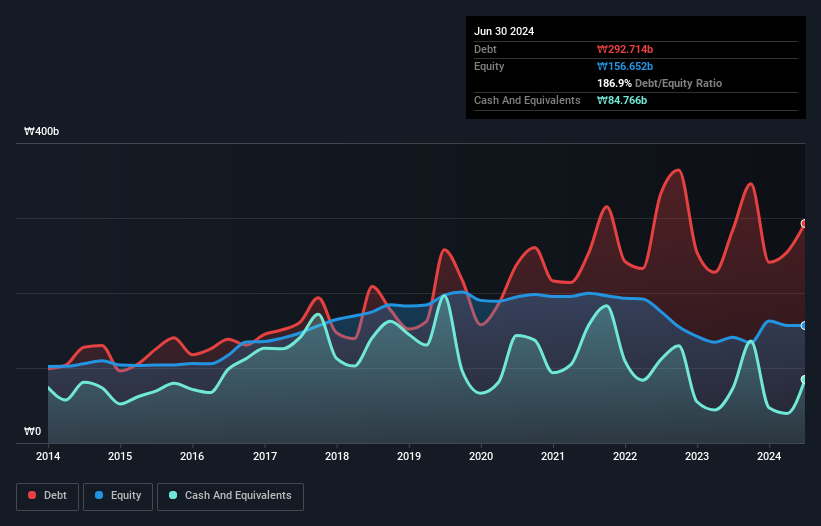
Some say volatility, rather than debt, is the best way to think about risk as an investor, but Warren Buffett famously said that 'Volatility is far from synonymous with risk.' So it might be obvious that you need to consider debt, when you think about how risky any given stock is, because too much debt can sink a company. We can see that Autech Corporation (KOSDAQ:067170) does use debt in its business. But is this debt a concern to shareholders?
Why Does Debt Bring Risk?
Debt is a tool to help businesses grow, but if a business is incapable of paying off its lenders, then it exists at their mercy. If things get really bad, the lenders can take control of the business. While that is not too common, we often do see indebted companies permanently diluting shareholders because lenders force them to raise capital at a distressed price. Of course, plenty of companies use debt to fund growth, without any negative consequences. The first thing to do when considering how much debt a business uses is to look at its cash and debt together.
View our latest analysis for Autech
How Much Debt Does Autech Carry?
The chart below, which you can click on for greater detail, shows that Autech had ₩292.7b in debt in June 2024; about the same as the year before. On the flip side, it has ₩84.8b in cash leading to net debt of about ₩207.9b.

How Healthy Is Autech's Balance Sheet?
We can see from the most recent balance sheet that Autech had liabilities of ₩471.4b falling due within a year, and liabilities of ₩82.0b due beyond that. Offsetting this, it had ₩84.8b in cash and ₩7.33b in receivables that were due within 12 months. So its liabilities total ₩461.3b more than the combination of its cash and short-term receivables.
This deficit casts a shadow over the ₩55.4b company, like a colossus towering over mere mortals. So we definitely think shareholders need to watch this one closely. At the end of the day, Autech would probably need a major re-capitalization if its creditors were to demand repayment. The balance sheet is clearly the area to focus on when you are analysing debt. But it is Autech's earnings that will influence how the balance sheet holds up in the future. So when considering debt, it's definitely worth looking at the earnings trend. Click here for an interactive snapshot.
In the last year Autech had a loss before interest and tax, and actually shrunk its revenue by 5.3%, to ₩940b. That's not what we would hope to see.
Caveat Emptor
Importantly, Autech had an earnings before interest and tax (EBIT) loss over the last year. Indeed, it lost a very considerable ₩12b at the EBIT level. When you combine this with the very significant balance sheet liabilities mentioned above, we are so wary of it that we are basically at a loss for the right words. Sure, the company might have a nice story about how they are going on to a brighter future. But the reality is that it is low on liquid assets relative to liabilities, and it lost ₩20b in the last year. So we're not very excited about owning this stock. Its too risky for us. The balance sheet is clearly the area to focus on when you are analysing debt. But ultimately, every company can contain risks that exist outside of the balance sheet. Case in point: We've spotted 4 warning signs for Autech you should be aware of, and 2 of them can't be ignored.
At the end of the day, it's often better to focus on companies that are free from net debt. You can access our special list of such companies (all with a track record of profit growth). It's free.
New: Manage All Your Stock Portfolios in One Place
We've created the ultimate portfolio companion for stock investors, and it's free.
• Connect an unlimited number of Portfolios and see your total in one currency
• Be alerted to new Warning Signs or Risks via email or mobile
• Track the Fair Value of your stocks
Have feedback on this article? Concerned about the content? Get in touch with us directly. Alternatively, email editorial-team (at) simplywallst.com.
This article by Simply Wall St is general in nature. We provide commentary based on historical data and analyst forecasts only using an unbiased methodology and our articles are not intended to be financial advice. It does not constitute a recommendation to buy or sell any stock, and does not take account of your objectives, or your financial situation. We aim to bring you long-term focused analysis driven by fundamental data. Note that our analysis may not factor in the latest price-sensitive company announcements or qualitative material. Simply Wall St has no position in any stocks mentioned.
About KOSDAQ:A067170
Autech
Engages in the development and sale of vehicles for special purposes in South Korea.
Mediocre balance sheet low.
Market Insights
Community Narratives





